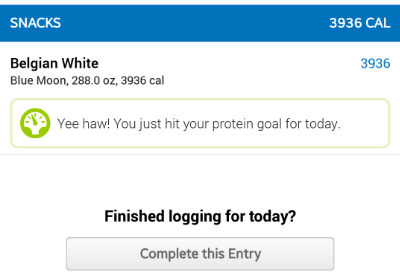Screw protein

almonds1
Posts: 642 Member
I am sick of powder.... I am almost sick of consuming 1g per lb of body weight
0
Replies
-
... and?0
-
that's it... no and0
-
Can you get your protein from eating food instead?0
-
yes, I tend to do that. I had a nutritionist tell me that 90G was fine.0
-
Try beer:
 0
0 -
Try beer:

I could use a 288 Oz pint lol0 -
Try beer:

I could use a 288 Oz pint lol
I accidentally put in 24 x 12 oz serves, instead of 24oz. I love that the app was happy for me.0 -
It all depends on your fitness goals. The regular, average person needs nowhere near 1g/lb of body weight.
But of course if you're trying to build muscle, you're not trying to be just average 0
0 -
It all depends on your fitness goals. The regular, average person needs nowhere near 1g/lb of body weight.
But of course if you're trying to build muscle, you're not trying to be just average
Nah, at this point its all about staying lean!!0 -
Have a steak
 0
0 -
Try beer:

I could use a 288 Oz pint lol
I accidentally put in 24 x 12 oz serves, instead of 24oz. I love that the app was happy for me.
… And throwing a cowboy celebration!0 -
There's protein in screws? I get that screws are probably a really good source of iron, but I'm pretty sure they don't contain protein.
:bigsmile:0 -
Isn't it 1 gram of protein for each pound of LBM (not bodyweight)?0
-
There's protein in screws? I get that screws are probably a really good source of iron, but I'm pretty sure they don't contain protein.
:bigsmile:
maybe I was thinking nail protein ?0 -
There's protein in screws? I get that screws are probably a really good source of iron, but I'm pretty sure they don't contain protein.
:bigsmile:
Either that or it's the protein you get from the other type of screw :devil:0 -
But think of all the calories you'll burn screwing....
:glasses:0 -
There's protein in screws? I get that screws are probably a really good source of iron, but I'm pretty sure they don't contain protein.
:bigsmile:
Either that or it's the protein you get from the other type of screw :devil:
the best kind :glasses:0 -
Isn't it 1 gram of protein for each pound of LBM (not bodyweight)?
ya, I go by kilos now...0 -
In the immortal words of Frank Drebin - "Nice beaver."
(Another vote for 1g per lb of lean mass, not total bodyweight.)0 -
It all depends on your fitness goals. The regular, average person needs nowhere near 1g/lb of body weight.
But of course if you're trying to build muscle, you're not trying to be just average
Nah, at this point its all about staying lean!!
If your goal is to maintain then I don't know where you got the idea from that you need 1gb/lb.
There's not even any science behind 1g/lb for actually building muscle, let alone maintaining.
The last time I bothered to look into it, depending on the study, the amount of protein needed to maintain ranged from a third of that to less than half.
Here's just a few studies to give you an idea:
"Lean body mass (density) was maintained in bodybuilders consuming 1.05 g protein.kg-1.day-1. Endurance athletes excreted more total daily urea than either bodybuilders or controls. We conclude that bodybuilders during habitual training require a daily protein intake only slightly greater than that for sedentary individuals in the maintenance of lean body mass and that endurance athletes require daily protein intakes greater than either bodybuilders or sedentary individuals to meet the needs of protein catabolism during exercise."
http://www.ncbi.nlm.nih.gov/pubmed/3356636
See that? 1.05g per KILOGRAM
Here's another:
"Knowing that the habitual protein intake of a strength athlete is on average 2 g/kg body weight per day (54), it is safe to say that whether novice or advanced, protein requirements for maintaining and/or gaining LBM are being met. Evidence has clearly shown that actual protein requirements for strength training are significantly lower at 1.2 g/kg body weight per day for advanced and 1.5–1.7 g/kg body weight per day for novice (31,32,43,57,59)."
http://journals.lww.com/nsca-scj/Fulltext/2012/10000/Protein_Requirements_for_Strength_Training.14.aspx0 -
It all depends on your fitness goals. The regular, average person needs nowhere near 1g/lb of body weight.
But of course if you're trying to build muscle, you're not trying to be just average
Nah, at this point its all about staying lean!!
If your goal is to maintain then I don't know where you got the idea from that you need 1gb/lb.
There's not even any science behind 1g/lb for actually building muscle, let alone maintaining.
The last time I bothered to look into it, depending on the study, the amount of protein needed to maintain ranged from a third of that to less than half.
Here's just a few studies to give you an idea:
"Lean body mass (density) was maintained in bodybuilders consuming 1.05 g protein.kg-1.day-1. Endurance athletes excreted more total daily urea than either bodybuilders or controls. We conclude that bodybuilders during habitual training require a daily protein intake only slightly greater than that for sedentary individuals in the maintenance of lean body mass and that endurance athletes require daily protein intakes greater than either bodybuilders or sedentary individuals to meet the needs of protein catabolism during exercise."
http://www.ncbi.nlm.nih.gov/pubmed/3356636
See that? 1.05g per KILOGRAM
Here's another:
"Knowing that the habitual protein intake of a strength athlete is on average 2 g/kg body weight per day (54), it is safe to say that whether novice or advanced, protein requirements for maintaining and/or gaining LBM are being met. Evidence has clearly shown that actual protein requirements for strength training are significantly lower at 1.2 g/kg body weight per day for advanced and 1.5–1.7 g/kg body weight per day for novice (31,32,43,57,59)."
http://journals.lww.com/nsca-scj/Fulltext/2012/10000/Protein_Requirements_for_Strength_Training.14.aspx
My original goal was to build muscle and cut... I was making a point that I am at maintenance now and will not need the protein intake I was doing before0 -
There have been several studies since the 80s that show that you need .55g/1lb of lean body mass. Once they went lower, their performance suffered.
Excessive protein intake and low carb intake will flush out water weight. When you re-add carbs you "puff out" due to water retention (and sodium if you're consuming loads of that)0 -
There have been several studies since the 80s that show that you need .55g/1lb of lean body mass. Once they went lower, their performance suffered.
Excessive protein intake and low carb intake will flush out water weight. When you re-add carbs you "puff out" due to water retention (and sodium if you're consuming loads of that)
while it's true that a low carb diet will reduce the water weight in your body and eating more carbs will make it return, it's actually a good thing to have more of this water in your system. It's stored along with glycogen in your muscles and liver, and it is your body's short term energy reserve (fat is the long term energy reserve). Depleting your glycogen stores =/= flushing out water weight (it reduces water weight but the emotive use of the term "flush out" suggests that this water is bad and unwanted... it's not). Replenishing your glycogen stores =/= puffing out. You may see a small size and firmness increase in your muscles when they're storing more glycogen. Most people consider that this makes the muscle look more "toned" and therefore improves the look of the human body. Quite a few women freak out about it, thinking that they;re "bulking up" but it's not that they don't like how it looks right now, they think they'll get the same increase every time the work out (they won't, because it's not muscle growth). Glycogen storage in the liver doesn't change your appearance at all.
Anyway, carbohydrate is good for you, and having more glycogen in your system is a good thing.
Sodium water weight gains can be harmful if they are excessive (e.g. it can cause raised blood pressure) - for most people, a little extra sodium won't do much harm. It's a good idea not to consume high levels of sodium constantly, especially where there's a family history of heart disease or high blood pressure. But too little sodium can also be harmful, so people shouldn't be afraid of sodium... you need to find a happy medium with sodium, as you do with fat and carbs.0 -
Try beer:

I'm kind of adoring this new add on to the app- I get so confused when they tell me my ice cream has protein in it- or whatever the hell it says- it's hysterical.0 -
It's not very difficult to get your protein in forms other than powder. Dead animals of any type, cheese, eggs, good quality protein bars etc.0
-
Isn't it 1 gram of protein for each pound of LBM (not bodyweight)?
Correct.0 -
It's not very difficult to get your protein in forms other than powder. Dead animals of any type, cheese, eggs, good quality protein bars etc.
Does protein only form in animals after they die?0 -
But think of all the calories you'll burn screwing....
:glasses:
I'm sure you would know all about that :laugh:
:laugh:
Congrats!0 -
I guess I'd give it to a t-bone but I'd have to warm it up first.....0
-
It's not very difficult to get your protein in forms other than powder. Dead animals of any type, cheese, eggs, good quality protein bars etc.
Does protein only form in animals after they die?
Good point. Chasing after the animals to eat them while they are still alive would be a good cardio burn as well. Win/win!0
This discussion has been closed.
Categories
- All Categories
- 1.4M Health, Wellness and Goals
- 398.2K Introduce Yourself
- 44.7K Getting Started
- 261K Health and Weight Loss
- 176.4K Food and Nutrition
- 47.7K Recipes
- 233K Fitness and Exercise
- 462 Sleep, Mindfulness and Overall Wellness
- 6.5K Goal: Maintaining Weight
- 8.7K Goal: Gaining Weight and Body Building
- 153.5K Motivation and Support
- 8.4K Challenges
- 1.4K Debate Club
- 96.5K Chit-Chat
- 2.6K Fun and Games
- 4.8K MyFitnessPal Information
- 12 News and Announcements
- 21 MyFitnessPal Academy
- 1.6K Feature Suggestions and Ideas
- 3.2K MyFitnessPal Tech Support Questions















